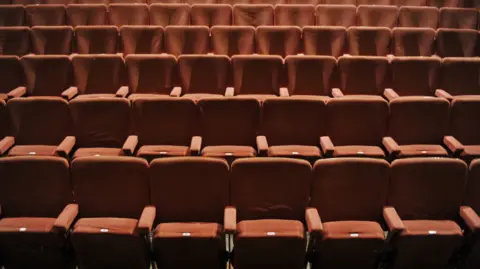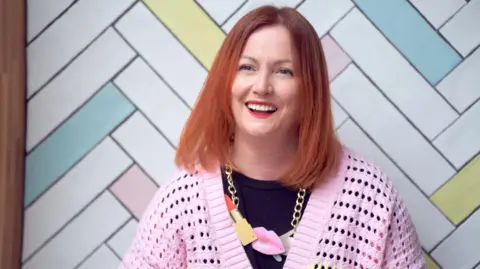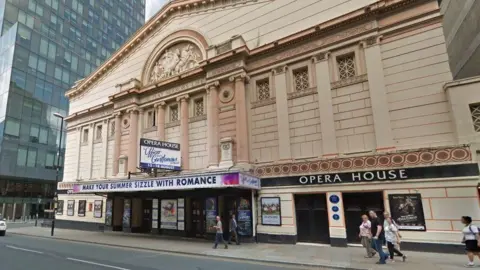What's behind an apparent rise in theatre abuse?
 BBC
BBCAn apparent rise in incidents of abuse from theatre audience members could be a reflection of society's values changing, academics have said.
Author and doctor of audiences Dr Kirsty Sedgman said she had noticed a marked increase in such disturbances during her research - following a spate of recent fractious incidents.
Earlier in February, Liverpool's Royal Court said it was forced to remove one audience member after a homophobic comment was shouted during a play.
A Dolly Parton-themed musical in Manchester also had to be suspended when homophobic abuse was hurled at the stage.
Dr Sedgman said abuse on such a scale would not have been accepted five years ago, but in a current cultural climate which has seen some politicians and public figures openly express more incendiary views, people may feel "they have been given permission" to express similar opinions.
"When people feel like they have permission to fight against progressive values we see a move towards regressive values," she said.
 Kirsty Sedgman
Kirsty SedgmanThe author, who researched audience behaviour for her book, On Being Unreasonable, said there was a phenomenon known as a "window of permission" that shrinks or widens based on the evolution of societal values and norms.
"So as we see more politicians and public figures voicing these views the window of what is acceptable is widened to encompass these abhorrent ideas," she said.
"This leads to people believing that that they are not only right to voice these views themselves in public, but actually virtuous."
Dr Sedgman said there had been a rise in audience members "doing a lot of weird things" in recent years.
She noted examples including the person who handed Pink her mother's ashes at a concert and the fight that broke out over singing during a production of the Bodyguard.
"The data is still emerging but I have spoken to front of house staff, actors and police as part of my research and what's clear is that this is a problem that is getting worse," she said.
"The longer I have studied audiences the more I've noticed they are often where social political changes erupt. This is why we have to pay attention to audience behaviour and the changes we are seeing."
 Google
GoogleStevie Webb, who starred in the Dolly Parton musical Here You Come Again, said the incident at the Opera House saw the cast walk off "because a woman was so disgusted there was a gay character".
He said it was followed by similar trouble the following weekend and that both experiences had "really opened my eyes".
"We're in such a bubble in this industry. But travelling the country and seeing how many people literally cannot bear to see a gay person depicted on stage - it's wild," he said.
Dr Sedgman said the issue was not limited to certain genres of theatre. In 2024 Francesca Amewudah-Rivers received "a barrage of deplorable racial abuse" after she was cast as Juliet in the Shakespeare classic.
Sarah Miguel from the LGBT foundation in Manchester said she was disappointed whenever she heard about such incidents but not shocked.
"We're seeing rising homophobia across the UK and beyond," she told BBC Radio Manchester.
"When people feel legitimised in holding these attitudes in 2025 we unfortunately have come to expect that LGBTQ+ safety is at risk in certain places."
 Dr Joshua Edelman
Dr Joshua EdelmanDr Joshua Edelman, reader in drama and contemporary performance at Manchester Metropolitan University, said mobile phones were also changing people's behaviour, with some people filming shocking or controversial behaviours for attention.
"Everyone has phones, there is this cult of recording everything that happens," he said.
"People are also starting to do these things for the camera. They are making a stink because they want to be seen making a stink."
Following the Dolly Parton incident, Manchester Opera House said such incidents were "rare" and that anyone engaging in abusive behaviour would be removed "immediately".
Liverpool's Royal Court said "offensive, hateful language is unacceptable" and has no place in the venue, Liverpool or wider society.
Dr Sedgman said she believes the only way to handle the issue going forward is to ensure all theatres adopt the same "zero tolerance approach".
"They need to be mindful that the people who have to deal with those incidents are often the front of house staff and the ushers," she said.
"They are often the most poorly paid and end up being subject to abuse themselves when they have to intervene."
Listen to the best of BBC Radio Manchester on BBC Sounds and follow BBC Manchester on Facebook, X, and Instagram, and watch BBC North West Tonight on BBC iPlayer.
